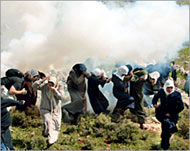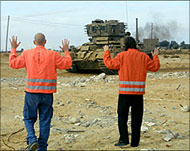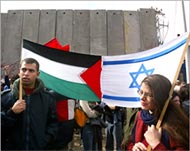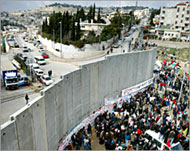Airport security as political bullying
A recent trip by Holocaust survivor Hedy Epstein, 79, to see for herself what is happening to Palestinians under Israeli occupation in the West Bank and Gaza ended with shocking humiliation.

Epstein says she was questioned for five hours by a security team at Israel’s Ben Gurion airport when she arrived for her flight home to Saint Louis, Missouri, in the United States.
After it was discovered that she had visited the Palestinian cities of Bethlehem and Qalqilya and participated in protests against the separation wall Israel is building, she was taken off to a side room.
There she was told to undress.
A woman security officer carried out a “strip search of every part of my naked body,” she recalls. “The only shame these security officials expressed was to turn their badges around so that their names were invisible.
“The only conceivable purpose for this gross violation of my bodily integrity was to humiliate and terrify me,” she adds.
Epstein, whose parents were killed during the Holocaust and was saved because she was smuggled out of Nazi Germany in 1939, says the airport checks were the final indignity in a trip full of horrors.
Brutal scenes
She was appalled to see Israeli bulldozers tearing down ancient olive groves near Bethlehem and the shooting of an unarmed Israeli protester, Gil Naamati, at a demonstration in the West Bank village of Masha.
 |
|
Palestinians have to face Israeli |
The soldier who wounded him later excused his action by saying he thought the protester was a Palestinian.
Because Israel has full control of the Palestinian territories it occupied since 1967, it manages all border traffic.
Since the outbreak of the Intifada, Palestinians have found it increasingly difficult to gain permits allowing them to travel abroad.
Until recently, interrogation and body searches at the airport were carried out almost exclusively on two groups only: Israel’s Palestinian citizens, who comprise nearly 20% of the population, and foreign activists suspected of belonging to Palestinian solidarity movements.
Officially, the airport authorities justify their harsh treatment of these groups on security grounds.
They claim that because Palestinians with Israeli citizenship and foreign activists are more likely to come into contact with Palestinians, there is a greater danger that they may try to smuggle weapons or bombs on to planes.
But there has been long-standing suspicion that this is not the full story.
Human shields blocked
Foreign activists with groups such as the International Solidarity Movement (ISM), say their degrading treatment at the airport is designed to dissuade other activists from coming to Israel and to further isolate Palestinians.
 |
|
Foreign ISM activists try to |
Many add that since a year ago when ISM activists were apparently being targeted by the army, the campaign has had an even more dramatic effect, severely reducing the number of activists prepared to visit the occupied territories.
Foreigners Rachel Corrie and Tom Hurndall were killed by soldiers during solidarity protests.
A document issued since January to all foreigners arriving at Ben Gurion airport is also expected to cut the number of independent observers in the West Bank and Gaza Strip.
Under the title Welcome to Israel, new arrivals are warned that entering a Palestinian area without prior authorisation “may result in legal measures being taken against you, including deportation and refusal of re-entry into the State of Israel”.
In Gaza, which is sealed off from Israel by an electrified fence, authorisation must be obtained from officials at the Erez crossing point.
But it is still unclear from whom authorisation can be obtained for entry to the West Bank.
Israelis humiliated
Palestinians with Israeli citizenship, in contrast to foreign visitors, have been subject to stringent security checks since the creation of Israel.
Despite Israeli claims that such checks are carried out only in the interests of ensuring the safety of passengers, Arab citizens report being treated uniformly in a humiliating manner.
|
“Once every Arab was considered a terrorist. Then it was everyone who knows an Arab, and now it’s anyone who knows someone who knows an Arab. Altogether that adds up to quite a few people” Former airport security officer |
This was highlighted last month by the experience at Ben Gurion airport of Lutfi Manshur, the editor of one of Israel’s most influential Arab newspapers, al-Sinara.
He had been invited to join Israeli President Moshe Katsav, as the only Arab representative on a visit to France where Katsav was to speak about anti-Semitism.
Manshur found himself singled out from the 35-member delegation for extra security checks, including having his bags X-rayed and undergoing a body search.
He eventually declined to board the plane and stayed in Israel.
Afterwards, Manshur said: “I told some of my Jewish friends that I felt like a Jew in the last century. The problem is that [the security officials] were contemptuous of the president. I’m used to it. But remember, the president is going to France to talk about racism, not shellfish.”
After Katsav publicly denounced Manshur’s treatment, the head of the Shin Bet, Avi Dichter, sent a letter to the newspaper editor to apologise for the “extensive” security procedures.
More targets
But it has become apparent over the past few months that a new group has been added to the list of those likely to be humiliated at the airport: leftwing Israeli Jews.
The Israeli authorities have always tracked closely the small number of Israelis – maybe a few dozen – belonging to extreme or militant anti-Zionist groups.
 |
|
Leftwing Israelis protest with |
But they now seem to be worried by what they see as the increasing radicalisation of some leftwing activists, especially among the youth.
The security services have been particularly alarmed at the number of Israelis prepared to cross the Green Line, the pre-1967 border with the West Bank, in violation of military orders, to see for themselves what the country’s army is doing.
Many have been drawn to visit Palestinian villages for the first time by demonstrations against the separation wall.
Like Naamati, some not only witness Palestinian hardship but also experience first-hand army brutality.
One Arab-Jewish co-operation group, Taayush, has reported violent treatment at the hands of soldiers after staging protests in the occupied territories.
Blacklisted?
A recent survey by Haaretz of leftwingers’ experiences at the airport discovered that many believed they were now on a Shin Bet “blacklist” of radical activists, although the security services have denied such a list exists.
Those who report being listed include soldiers refusing to serve in the occupied territories, as well as academics, journalists and business people belonging to leftwing and human rights organisations.
 |
|
Israeli intimidation methods are |
The Haaretz revelations led to a heated Knesset debate, with several members expressing concern that Jews were being humiliated at the airport. Avraham Burg called the new practices “a danger to democracy”.
Isam Makhul, an Arab Knesset member, added: “It was clear that once people were silent and accepting when Arab [rights] were infringed, Jews pursuing peace would also be affected, and eventually everyone who disagrees with the government’s official line will be sharply and brutally affected.”
Rightwing members, however, argued that leftwing groups posed a threat to the state. Yaakov Margi of Shas said: “Leftwing activists are rubbing elbows with people who are a danger to Israel, so you have to be checked.”
A colleague, Nissim Zeev, added: “From my point of view, leftwing activists should be checked like terrorists.”
Warnings
A typical story comes from Uri Ayalon, 24, of Tel Aviv who has written in the Israeli press about his training in the ISM and been prominent in demonstrations against the wall.
Shortly after he wrote about the ISM, he arrived at the airport for a flight to Paris to find himself being taken aside for questioning. He narrowly made his flight after two hours of interrogation.
|
“The feeling is that there is an attempt to keep populations separate, to prevent co-operation that crosses lines between people from the two nations” Yossi Wolfson, |
In Paris, he socialised with a group of Israelis that included a security checker at the Paris airport. When Ayalon turned up for his return flight, the checker warned him that he had seen his name on a list of “dangerous people”.
Ayalon was again questioned at length and had his Palm Pilot confiscated. It was returned to him five months later.
A month after his return, Ayalon, like a growing number of leftwingers, reported being called to a “clarification meeting” at his local police station, where a Shin Bet official warned him against meeting Arabs.
Guilt by association
A former airport security officer recently told Haaretz anonymously: “Once, every Arab was considered a terrorist. Then it was everyone who knows an Arab, and now it’s anyone who knows someone who knows an Arab. Altogether that adds up to quite a few people.”
Yossi Wolfson, a lawyer from the Israeli human rights group Hamoked, explains the rationale for the crackdown on leftwingers.
“When I examine who the Shin Bet is interested in talking to, the conclusion is that it’s almost everyone who is engaged in joint activity with Palestinians,” he says.
“Of course, one can argue that the motive is security but the feeling is that there is an attempt to keep populations separate, to prevent co-operation that crosses lines between people from the two nations, to suppress what the establishment perceives as a dangerous social phenomenon.”